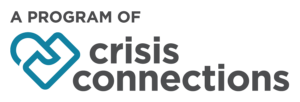Washington Support After Suicide

a program for those in Washington State who have lost someone to suicide
Crisis Connections can help right now and offers programs to help survivors navigate complicated grief due to a suicide loss.

Talk with Someone Right Now - 988
We are here to talk with you, 24 hours a day, 7 days a week. Call or text 988 any time, and a real, compassionate, and nonjudgmental person will answer. We'll listen, understand, and support you however you need it. There is no wrong reason to call. No concern is too small or too big. And no grief is too old or too new.
Get Ongoing Support
When the death of a loved one occurs by suicide, it is often unexpected and shocking. The suicide can leave survivors unclear as to why it happened or if they could have prevented it. It may take a while to accept, but it is not your fault.
Healing from a suicide loss can be a long and difficult journey, but you are not alone.
Washington Support After Suicide (WASAS), formerly known as CC Cares, is a program for those newly bereaved by suicide from those who have been there. The program was originally started and nurtured by Forefront Suicide Prevention - A Center of Excellence at the University of Washington.
1:1 Grief Companion Peers
Talking to someone who has survived a loss can be healing for those who have more recently experienced a loss. In addition to a care package, WASAS also offers phone-based support from companions who have also experienced a suicide loss. We will do our best to match one of our volunteer companions based on the relationship of the loss, for example sibling, parent, friend.
Our mentor will first reach out within two weeks of the request to make sure that the loss survivor wants the connection. We will also maintain communication only if the loss survivor would like.
Volunteer Requirements
Must be at least three years since loss due to suicide
Has received therapy, grief counseling, and/or group support
Willingness and desire to help others who have experienced similar pain
Care Package
We carefully craft a care package for those who are recently bereaved by a suicide. Included in this package are materials on grief after a suicide as well as comfort items found to be helpful by other survivors of suicide loss. These care packages are currently available for free to families living in Washington State.
Professionally Facilitated Support Groups
We offer a drop-in support group twice a month for those who have lost a loved one to suicide and reside in Washington State. These groups are held virtually and are facilitated by a licenced clinician experienced in grief due to suicide.
1st and 3rd Monday of the month
6:30-8:30pm
Free
Facilitators:
Nicole Davis, Licensed Mental Health Counselor
Rebecca Sauls, Mental Health Professional
Amira Fitzgerald, Support After Suicide Coordinator
Virtual/Online
Survivor Thoughts & Insights
After losing my sister to suicide, talking to a grief companion peer was the most helpful thing I did toward recovery.
By talking with someone who truly understood what I was going through was I able to give myself grace and find a way forward.
Sibling Loss Survivor
Seattle, WA
The care package arrived today and it was just perfect. Your organization and the care package are truly appreciated. I am most grateful.
Coworker Loss Survivor
Seattle, WA
Thank you for the care package. It really meant so much to me in the passing of my dad.
Anna
I wish I had reached out sooner for help after my brother died by suicide. I found this community six years later and felt a sense of connection and safety not found elsewhere. Surviving a loss from suicide can only truly be understood by someone who has also experienced a loss this way. WASAS provides a safe space where I feel supported and heard. I can talk openly about my loss and provide support and understanding to others. I feel like I am part of an essential service-centered community.
Devon
Grief Companion Peer
Sign up for the
Crisis Connections Newsletter
Sign up for
Crisis ConnectionsText Alerts
